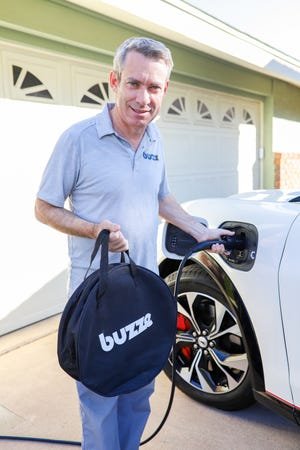A Ford Mustang Mach-E was the first new car Aaron Lieberman bought in more than a decade.
He didn’t know his new electric vehicle would become the core of his latest venture until he took an Uber to the airport.
The car was a Tesla and Lieberman asked the driver, who rented his home and did not have a charger installed there, where he charged it. The driver mentioned a spot in the Biltmore area.
Lieberman, who has a home charger, did a lot of research before making his purchase. Yet, this was an aspect of electric vehicle ownership that hadn’t crossed his mind.

“But, I started to think about it,” Lieberman said.
A veteran entrepreneur, Lieberman had discovered his next project.
At the time Lieberman, a former Arizona State Representative, was a fairly new electric vehicle owner. He bought the car the same month he dropped out of the race for governor in 2022.
“I unexpectedly found myself with more time on my hands over the next four years,” he said with a chuckle.
And the result is Buzze, an app that operates on a peer-to-peer shared network of home electric vehicle charging stations. The owners of those stations serve as hosts for electric vehicle drivers seeking a reliable place to charge up in a convenient spot, usually close to home.
Lieberman started Phoenix-based Buzze in 2022. After beta testing, it officially launched to the general public in November 2023.
It works like AirBnB, Turo or any ride-hailing service, with which hosts and users find each other and schedule a time to charge up to seven days in advance. Drivers can choose from a pay-as-you-go model at 25 cents per kilowatt-hour, or subscription plans that range from $50-$149 a month.
All arrangements are contactless and can be made even when hosts are nowhere near their home. Addresses for charging hosts are only made available to drivers after the reservation is booked and paid for. If a driver returns without a reservation, the app will shut down the driver’s ability to charge at that location.
Drivers secure a convenient time at a functioning charging station without the wait, and what they pay helps hosts offset the costs of installation.
“Both aspects are exciting to us,” Lieberman said. “We’re part of the sharing economy.”
Buzze launched to the public with about 25-30 hosts. Currently, there are more than 160 hosts in the Valley and more than 100 additional hosts in 29 other states, with those numbers growing weekly, Lieberman said. More than 1,000 drivers have downloaded the app.
Hosts have Level 2 chargers, which charge battery-electric vehicles from 0% to 80% in 4-10 hours and plug-in hybrids in two hours or less, according to the U.S. Department of Transportation.
When Lieberman installed his home charger, the $2,000 price tag wasn’t the biggest obstacle. He called 10 electricians before finding one willing to do the job.
Lieberman’s extensive research included a Ford study that indicated the hesitancy to purchase an electric vehicle is not range anxiety but charge anxiety. A 2023 study by Cox Automotive found that 32% of consumers who were considering an eclectic vehicle cited a “lack of charging stations in my area” as a barrier to purchase.
A 2023 J.D. Power study showed that an average of 20.8% of public charging stations are out of service at any time with that statistic higher in areas with more electric vehicles such as San Francisco.
Maryanne Rawald used to charge her Ford Mach-E at her gym and, when it was available, the charger at her apartment complex. Rawald has used Buzze since August 2023 to charge at a host located within walking distance of her Scottsdale home.

About twice a week Rawald drops her car off, walks home and lets it charge to 100% overnight. The next morning, she walks over to pick up her vehicle. The convenience and reliability are huge bonuses, she said.
“If you have an electric vehicle, you want to have options,” Rawald said. “The more there’s a push to have more options, more people will purchase electric vehicles.”
Hosts receive 20 cents per kilowatt-hour or more during peak hours and pull in about $400 a month, Lieberman said.
However, he said most hosts are motivated by helping other electric vehicle users rather than revenue.
Tony Perez, who owns a Ford F-150 Lightning, is one of them.
Perez has been a Buzze host since last summer and purchased the charging station for his Phoenix home right after purchasing his electric truck a year ago. His charger is used by Buzze drivers a few times a month, which helps maximize its use.
“Once your EV fills up, your charger just sits there,” Perez said. “I’m super thrilled about the opportunity to offer my home charger to people who don’t have charging access.”
Perez acknowledged the obstacles many electric vehicle drivers face when searching for a spot to charge. He hopes Buzze will alleviate that and get more environmentally-friendly cars on the road.
“I’m looking forward to seeing more electric vehicle drivers and hosts take advantage of that for that reason,” Perez said.
Buzze aims to be a key service to a global electric vehicle market that’s expected to reach $906.7 billion by 2028, according to the data and business intelligence platform Statista.
Lieberman said the goal is to get 1 million more electric vehicles on the road as a result of Buzze’s network. When this happens, it would be responsible to have helped remove 4.6 million metric tons of carbon dioxide from the air a year.
“What’s been so fun is building something that has the opportunity to have a huge impact on the environment and world we live in,” Liberman said. “That’s what motivates us.”
What: Buzze
Where: Phoenix
Employees: Four
Interesting stat: According to a 2023 Cox Automotive study, 32% of consumers who were considering an electric vehicle cited a “lack of charging stations in my area” as a barrier to purchase.
Details: buzze.biz
[ad_2]
Source link




